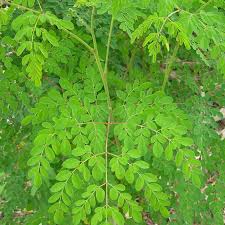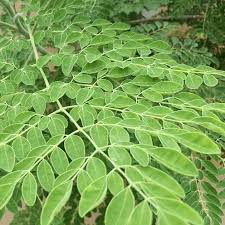Moringa leaflets are a key component of the Moringa oleifera plant, often referred to as the drumstick tree, horseradish tree, or simply Moringa. These leaflets are the small, green, and vibrant leaves that grow on the Moringa tree and are prized for their exceptional nutritional value and potential health benefits. Moringa leaflets are packed with essential vitamins and minerals, including vitamin C, vitamin A, vitamin E, calcium, potassium, and iron. They are also a good source of protein.
Moringa leaflets are known for their high antioxidant content, which helps combat oxidative stress and reduce the risk of chronic diseases. These leaflets are especially valuable in regions with malnutrition issues, as they provide a significant source of essential nutrients.
Moringa leaflets can be consumed fresh or cooked and are used in a variety of traditional dishes in regions where the tree grows. They have a mild, slightly peppery flavor. Moringa leaflets are believed to have various health benefits, including potential anti-inflammatory, antifungal, and antimicrobial properties. They may also help lower blood sugar levels and support heart health.
In traditional medicine, Moringa leaflets have been used for centuries to treat various ailments. They have been used to alleviate symptoms of conditions like diabetes, hypertension, and digestive issues. Moringa leaflets are commonly used as a dietary supplement and can be found in various forms, including Moringa powder, capsules, or teas. These supplements are popular for their convenience and long shelf life.
Moringa trees are highly sustainable and can thrive in arid conditions, making them an environmentally friendly food source. They are also used for soil improvement and as a natural water purifier.
While Moringa leaflets offer many potential health benefits, they may not be suitable for everyone. Individuals taking medication or pregnant and nursing women should consult with a healthcare professional before using Moringa supplements.
Moringa leaflets are a versatile and nutritious food source that has gained popularity in recent years due to their health benefits. They can be used in various culinary and dietary applications and are considered a valuable addition to a balanced diet.
The Economic Importance and Uses of Moringa Leaflets

Moringa leaflets, which are the leaves of the Moringa tree (Moringa oleifera), have a wide range of economic importance and uses. This tree is often referred to as the “drumstick tree” or the “miracle tree” due to its nutritional and medicinal properties.
Here are some of the economic importance and uses of Moringa leaflets:
1. Nutritional Value: Moringa leaflets are highly nutritious and are a good source of essential vitamins and minerals. They contain vitamins A, C, and E, calcium, potassium, and protein. They are particularly valuable in regions where malnutrition is a concern.
2. Food Source: Moringa leaflets are used as a food source in many parts of the world. They can be consumed fresh, dried, or as a powder. They are used in a variety of dishes, including soups, stews, curries, and salads.
3. Medicinal Uses: Moringa leaflets have numerous medicinal uses. They are believed to have anti-inflammatory, antioxidant, and antimicrobial properties. They are used in traditional medicine to treat a range of ailments, including digestive disorders, skin infections, and anemia.
4. Pharmaceutical Industry: The bioactive compounds found in Moringa leaflets are of interest to the pharmaceutical industry. Research is ongoing to harness these compounds for the development of new drugs and treatments.
5. Cosmetic Products: Moringa leaflets are used in the cosmetic industry for their skin-boosting properties. They are added to skincare products like lotions, creams, and oils to improve skin health and reduce signs of aging.
6. Livestock Feed: Moringa leaflets can be used as supplementary livestock feed. They provide a valuable source of nutrition for livestock, including poultry and cattle.
7. Biogas Production: Moringa leaflets can be used as a feedstock for biogas production. They are rich in organic matter and can be used in anaerobic digestion systems to generate biogas for cooking and heating.
8. Water Purification: Moringa leaflets contain natural coagulants that can be used to purify water. When crushed and added to turbid water, they help to clarify the water by binding with impurities and settling them to the bottom.
9. Fertilizer: The leaves can be used as green manure or as an organic fertilizer. When they decompose, they enrich the soil with essential nutrients, making them beneficial for agriculture.
10. Economic Opportunities: Moringa cultivation provides economic opportunities for farmers. The leaves can be harvested and sold in local markets or used as a cash crop, providing a source of income.
11. Erosion Control: Moringa trees, including their leaflets, are used in reforestation and erosion control efforts. Their deep root systems help stabilize soil and prevent erosion.
Read Also: Moringa Seeds: Economic Importance, Uses, and By-Products
12. Biodiesel Production: The oil extracted from Moringa seeds, not the leaflets themselves, can be used as a source of biodiesel. Biodiesel production can have economic implications.
The Products and By-products That Can Be Derived From Moringa Leaflets
Moringa leaflets, or moringa leaves, are known for their nutritional and medicinal properties. They can be used to produce a variety of products and by-products.
Here’s a list and explanation of some of them:
1. Moringa Leaf Powder: This is one of the most common and versatile products derived from moringa leaflets. The leaves are dried and ground into a fine powder. Moringa leaf powder is rich in essential nutrients, including vitamins, minerals, and protein. It can be used as a dietary supplement or added to smoothies, soups, or other dishes for added nutrition.
2. Moringa Tea: Moringa leaves can be dried and used to make a nourishing and caffeine-free herbal tea. It is a natural source of antioxidants and can provide a refreshing and healthy beverage option.
3. Moringa Oil: While moringa oil is primarily derived from the seeds of the moringa tree, some varieties of moringa leaves can be used to extract a small amount of oil. Moringa oil is known for its moisturizing and anti-inflammatory properties, making it useful in skincare and haircare products.
4. Moringa Capsules: Moringa leaf powder can be encapsulated, making it convenient for people to consume as a dietary supplement. This is a popular way to ensure a consistent and measured intake of moringa’s nutrients.
5. Moringa Leaf Extract: Moringa leaves can be processed to create concentrated liquid extracts, which can be used in the production of various health supplements and herbal remedies.
6. Moringa Leaf Tea Bags: Dried moringa leaves can be packed into tea bags, making it easier to prepare and consume moringa tea. This is a convenient way to enjoy the benefits of moringa without the need for loose leaves.
7. Moringa Leaf Infused Oils: Moringa leaves can be infused into carrier oils like coconut or olive oil to create Moringa-infused oils. These oils can be used for massages and as a base for skincare products.
8. Moringa Leaf Pesto: Moringa leaves can be used to make a nutritious pesto sauce by blending them with ingredients like garlic, nuts, olive oil, and parmesan cheese. This provides a flavorful way to incorporate moringa into your diet.
9. Moringa Leaf Residue: After extracting the oil or making tea, the leftover moringa leaf residue can be used as a natural fertilizer for plants and gardens due to its nutrient-rich content.
10. Moringa Leaf Mulch: Moringa leaves can be dried and ground into mulch, which can be spread on the soil to improve moisture retention and add nutrients to the soil.
11. Moringa Leaf Animal Feed: Moringa leaf powder and dried leaves can be used as a supplement in animal feed for livestock and poultry, providing essential nutrients.
12. Moringa Leaf Compost: Moringa leaves can be composted to create nutrient-rich organic compost, which can be used to enrich garden soils.
13. Moringa Leaf Face Masks: Dried moringa leaves can be ground into a fine powder and used as an ingredient in homemade facial masks for their potential skin benefits.
In conclusion, the versatility of moringa leaves makes them a valuable resource for a range of products and by-products, from nutritional supplements to skincare items and even agricultural enhancements.
Read Also: Benefits of Passion Flowers

